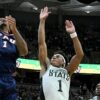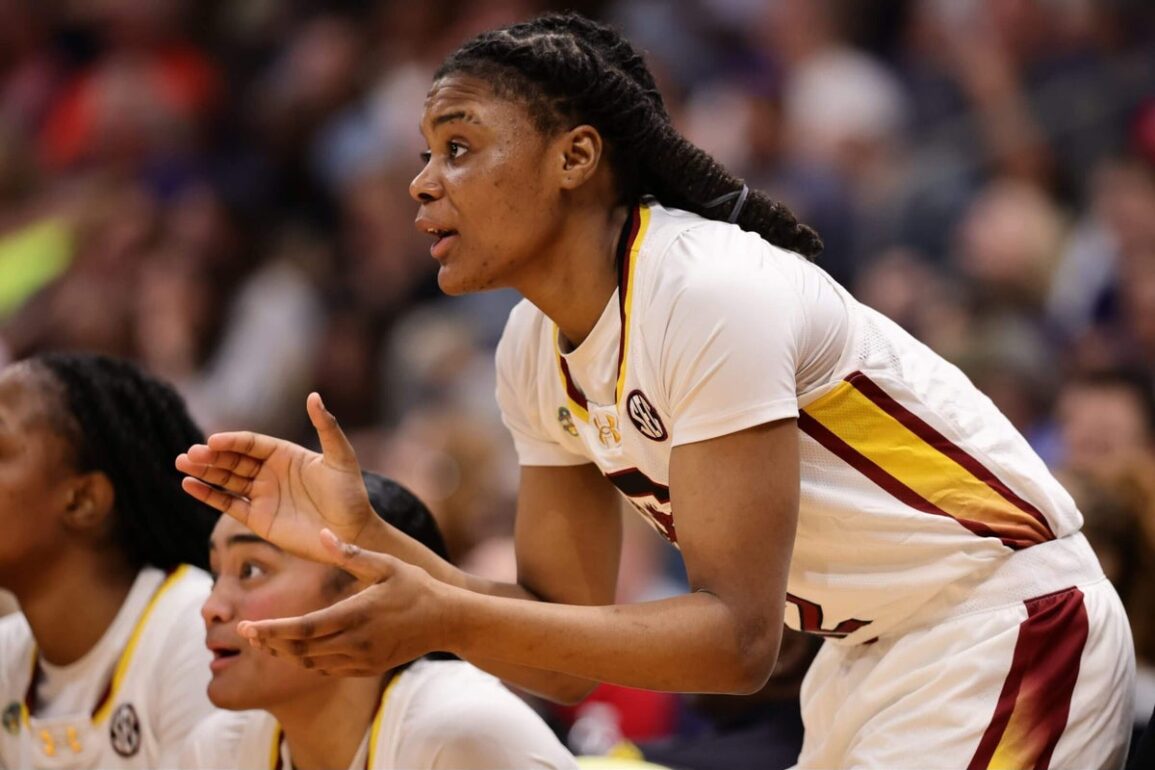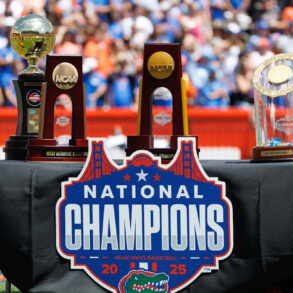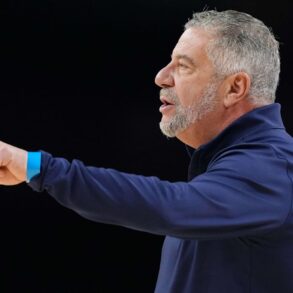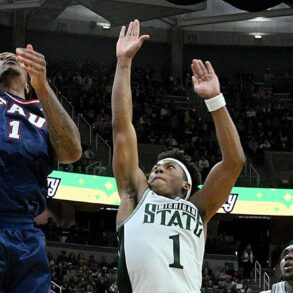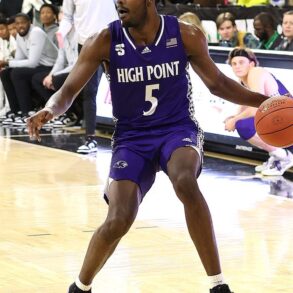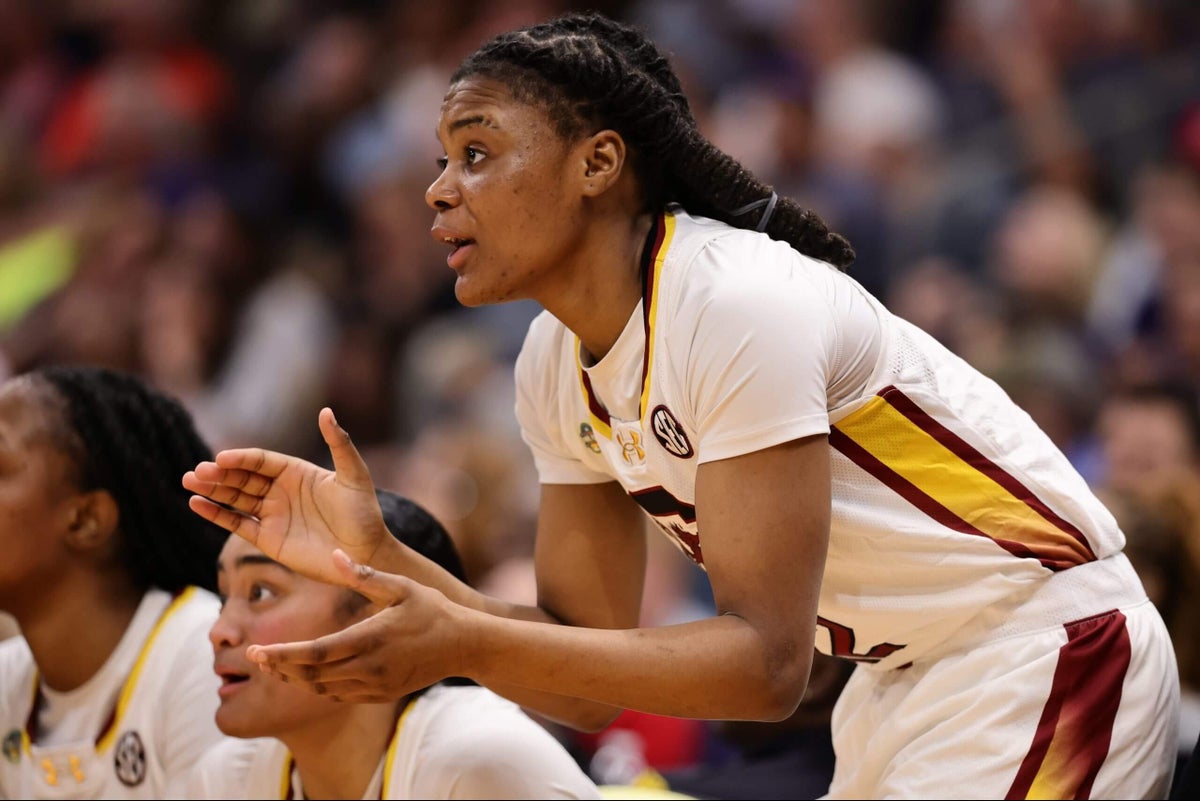
It’s transfer portal season, which means that every college basketball staff across the country has someone refreshing the portal constantly to see which players have entered their names.
The NCAA transfer portal started in 2018, but everything changed in 2020, when the NCAA’s Division I Council granted a blanket waiver for players to become immediately eligible upon transferring from a Division I school. Previously, players had to sit out a season. Now, transfer portal recruiting has superseded even high school recruiting as the primary source of talent for some programs. This season, the NCAA shortened the portal window, which runs from March 24 until April 22.
Advertisement
The Athletic is tracking the biggest names who are seeking new programs:
1. Serah Williams
Wisconsin junior forward
Key stats: 19.2 PPG, 9.8 RPG, 2.4 APG, 2.3 blocks per game
With one season of eligibility remaining, the 6-foot-4 veteran can add production as a starter and ease the transition for a younger post teammate. Her offensive range is mostly contained to the paint, so she’s not going to stretch the floor offensively for any team. Her motor (32 minutes per game this season) and rim-protection (the 2024 Big Ten defensive player of the year) make her a top target in this transfer portal cycle.
2. MiLaysia Fulwiley
South Carolina sophomore guard
Key stats: 11.7 PPG, 2.8 RPG, 2.0 APG, 1.5 SPG (19 MPG)
Fulwiley was the most difficult player to place in this list. When she’s on, her talent is so obvious, and there’s not a roster in the country that wouldn’t benefit from that version of Fulwiley. But the flipside is that for every two plays or every highlight-reel type moment, there’s an opposite moment that made South Carolina coaches scratch their heads. This was the big reason for her up-and-down minutes. There’s an argument to be made that players can lessen those mistakes with more opportunities to play through them, but Fulwiley didn’t always seem to get that chance. So, the question looms: If Fulwiley receives more minutes at a new program, will the inconsistent play level out as she learns to play through mistakes? She has obvious upside, and in the right position, she may have a chance to become more consistent. But nothing is a given, so it’s hard to put her at the No. 1 spot.
MiLaysia Fulwiley behind the back and the finish!! pic.twitter.com/aNBK9zlsby
— Tyler DeLuca (@TylerDeLuca) March 28, 2025
3. Gianna Kneepkens
Utah redshirt junior guard
Key stats: 19.3 PPG, 5.0 RPG, 3.0 APG, 50% FG%, 45% 3 PT%
A 2025 All-Big 12 first-team selection, former All-Pac-12 first-team selection and 2022 Pac-12 freshman of the year, Kneepkens has one season remaining from a medical redshirt granted after she broke multiple bones in her right foot in the 2023-24 season. She bounced back from that injury for a phenomenal season, re-establishing herself as one of the nation’s best high-volume 3-point shooters (6.8 attempts per game). Playing within Utah’s offense, Kneepkens did the majority of her damage at the basket, from beyond the arc and at the free-throw line. As a rangy, 6-foot guard who can handle and distribute while hunting her own shot, she’s sure to be one of the best perimeter players available in the portal.
Advertisement
4. Iyanna Moore
Vanderbilt senior guard
Key stats: 12.4 PPG, 2.7 RPG, 2.7 APG
On a rebuilding Vandy team, Moore was often the third player mentioned among Mikayla Blakes, Khamil Pierre and herself, but Moore’s impact in Nashville was significant. With one season of eligibility remaining (from a medical redshirt year), she can be an off-ball guard who bolsters scoring and defensive efforts immediately. She’s a Wisconsin native, so could she potentially be looking to get back into Big Ten country? Or, in her final college season, is she looking for a larger role elsewhere?
5. Sa’Myah Smith
LSU redshirt sophomore forward
Key stats: 6.6 PPG, 6.4 RPG
Smith tore her ACL seven games into the 2023-24 season and worked her way back into form this year at LSU. Toward the end of the season, she was playing her best basketball. During the NCAA Tournament, she recorded her first career back-to-back double-doubles against Florida State (20 points, 12 rebounds) and NC State (21 points, 11 rebounds), and it still seems like Smith is just scratching the surface. She is also a solid defender who can match up well in one-on-one situations and can go extended minutes against top competition without getting into foul trouble. (She averaged 2.2 fouls per game this season.) With up to two seasons of eligibility remaining, the Texas native has a chance to establish herself at another program and continue to build her resume for the 2026 or 2027 WNBA Draft.
— Sa’Myah Smith (@samyahsmith5) April 3, 2025
6. Kara Dunn
Georgia Tech junior guard
Key stats: 15.5 PPG, 5.8 RPG, 1.2 APG, 1.3 SPG, 49 FG%
With the announcement of coach Nell Fortner’s retirement (and even before that became public), there has been quite the exodus from Georgia Tech. Dunn became the third starter to opt out as the Yellow Jackets search for a new coach.
Dunn took a huge jump between her freshman and sophomore seasons and elevated her game even more this past year as a junior. She’s mainly a two-level scorer, who finishes decently beyond the arc and well at the rim, is a low-turnover/low-mistake ballhandler and is a very crafty rebounder, especially for being just 5-foot-11. Dunn was named a first-team All-ACC selection this season, and it’s fair to assume her best basketball is still ahead of her based off how her game has improved each year. It’s easy to see her fitting into plenty of other power conference starting fives.
7. Tonie Morgan
Georgia Tech junior guard
Key stats: 13.7 PPG, 5.6 APG, 4.5 RPG
Teams are always looking for experienced, battle-tested point guards. That’s Morgan. With 95 starts under her belt and one season of eligibility remaining, she’s the kind of player that can be inserted into a starting lineup to help ease the graduation or departure of another PG. Morgan isn’t a great 3-point shooter, but she’s good at finishing at the rim and will easily fit in on another power conference roster.
Triple-double machine! 🔥
Tonie Morgan does it all with 12 PTS, 14 AST, and 12 REB in Georgia Tech’s dominant 89-65 win over Clemson. @GTWBB | @GTAthletics | #StingEm pic.twitter.com/YpMgmTtK3C
— ACC Digital Network (@theACCDN) January 19, 2025
8. Janiah Barker
UCLA junior forward
Key stats: 7.4 PPG, 6.0 RPG, 1.4 APG (18 MPG)
Barker spent last season coming off the bench for the Bruins after playing her first two seasons for Texas A&M. She was an instant impact player for UCLA , but she couldn’t crack the starting lineup. With her ability and athleticism, finding a starting role on another power conference roster shouldn’t be a problem. Like Olivia Miles (who was on this list before committing to TCU), the question often swirled: Will she stay or go? (She could have declared for the draft since Barker met the age minimum requirement.) But with a third school on the horizon, could the Georgia native end up closer to home?
Advertisement
9. Madina Okot
Mississippi State junior center
Key stats: 11.3 PPG, 9.6 RPG, 65% FG (23 MPG)
Okot’s numbers look particularly impressive considering she played just 23 minutes per game — that’s some high efficiency basketball. But from game to game, her performance fluctuated, and against top SEC opponents, she was typically less effective, especially from a scoring perspective. That said, this was her first season of college basketball in the U.S. after playing two seasons of college ball in Kenya. It’s fair to expect a jump in her senior season now that she’s acclimated to the NCAA. At 6-6, Okot has qualities teams simply can’t coach, so seeing her on a power conference roster feels like a given.
8. Oluchi Okananwa
Duke sophomore guard
Key stats: 10.1 PPG, 5.3 RPG, 1.8 APG, 1.8 SPG, 47% FG% (22 MPG)
In two seasons with the Blue Devils, Okananwa was a consummate sixth player (literally, earning the award from the ACC during the 2023-24 season). But with her efficiency and defensive prowess, it won’t be surprising to see her in a larger role (read: starting) at another program. Okanan was one of the best defenders in the ACC, finishing fifth in the conference in win shares (and highest among non-starters), so the 5-10 guard should be an obvious addition to most rosters that value both ends of the floor.
Oluchi Okananwa with a hand in her face at the shot clock buzzer 🔥 pic.twitter.com/b4XBu0dzyd
— espnW (@espnW) March 28, 2025
9. Debreasha Powe
Mississippi State junior guard
Key stats: 8.4 PPG, 2.8 RPG, 1.2 APG, 40.1 FG%, 39.8% 3 PT
With one year of eligibility remaining, Powe will be a nice backcourt addition on any roster looking to bolster its 3-point shooting as three-quarters of her shots came from beyond the arc and she was an impressive 39.8 percent from there. She has started all but one game of her career, so she also brings experience that could help propel some younger players forward.
10. Londynn Jones
UCLA junior guard
Key stats: 8.6 PPG, 1.4 RPG, 35% 3 PT
Jones was a regular starter for the Bruins as a freshman and sophomore, but she was moved into a sixth-player role as a junior as a part of the Bruins’ deep nine-player rotation. In her final season of college hoops, she’s likely looking to get heavier minutes and start, (which likely wasn’t going to happen at stacked UCLA ), so it’ll be interesting to see where the California native lands. Last season, she attempted seven 3-pointers per season and shot 37 percent on those attempts, ranking 14th nationally in percentage for players attempting seven-plus triples.
11. Kiyomi McMiller
Rutgers freshman guard
Key stats: 18.7 PPG, 4.7 RPG, 3.0 APG, 42% FG%
With three years of eligibility remaining and skills that can build a program, McMiller could be an instant impact player and a long-term investment. Notably, McMiller missed 10 games this season, and many of them were billed as “coach’s decisions.” She hasn’t played since early February. Even so, she’s going to be on many programs’ radars. Her 3-point shooting needs to improve, but she can be a reliable three-level scorer, and she’s a great defensive rebounder (more than four a game).
12. Breya Cunningham
Arizona sophomore forward
Key stats: 11.0 PPG, 7.0 RPG, 1.8 BPG
With 63 starts at Arizona, Cunningham brings solid experience to a new roster. At 6-4, she’s a strong rebounder, but defensively, she needs to improve. Her stats are particularly impressive, considering she played fewer than 23 minutes a game for the Wildcats. But the low minutes were a byproduct of fouling nearly four times per game and fouling out of seven games last season. Not great. Even so, Cunningham received honorable mention on the All-Big 12 list this season. If she can clean up the fouls and spend more time on the floor, she could be an asset over the next two seasons.
13. Kayleigh Heckel
USC freshman guard
Key stats: 6.1 PPG, 1.4 RPG, 1.9 APG, 46% FG
Heckel came off the bench the majority of the season for the Trojans. Even with a significant amount of minutes opening in the starting lineup next season, she has opted to go elsewhere. The New York native was a solid backup ballhandler and perimeter defender, and with three seasons of eligibility remaining, she’ll be a strong pickup for another program.
Kayleigh Heckel said ✌️
📺: @espn x @USCWBB x @Kayleigh_Heckel pic.twitter.com/PbcIiH8bYY
— Big Ten Women’s Basketball (@B1Gwbball) March 25, 2025
Who transferred where?
Clara Silva, center, Kentucky to TCU
Ta’Niya Latson, guard, Florida State to South Carolina
Olivia Miles, guard, Notre Dame to TCU
Cotie McMahon, forward, Ohio State to Ole Miss
Kate Koval, forward, Notre Dame to LSU
Yarden Garzon, guard, Indiana to Maryland
Dani Carnegie, guard, Georgia Tech to Georgia
Kendall Dudley, forward, UCLA to Michigan
Aaliyah Guyton, guard, Iowa to Illinois
Elina Aarnisalo, guard, UCLA to North Carolina
(Photo of MiLaysia Fulwiley: Carmen Mandato / Getty Images)
This post was originally published on this site be sure to check out more of their content.




